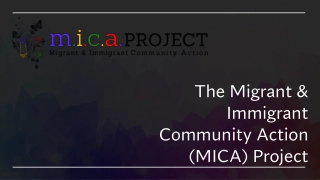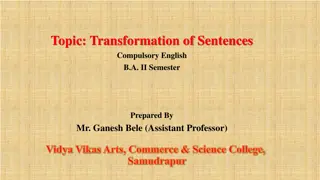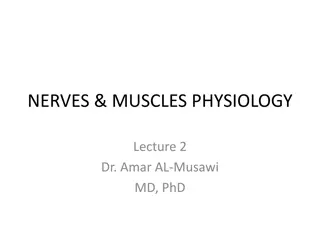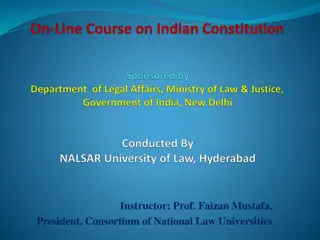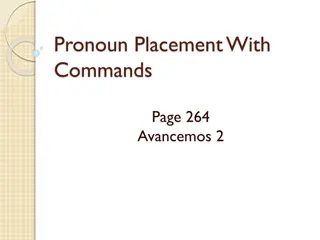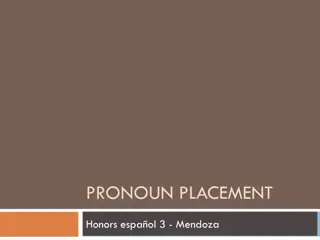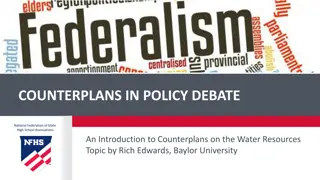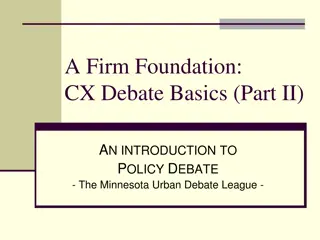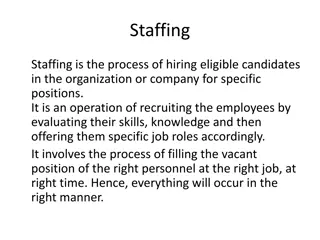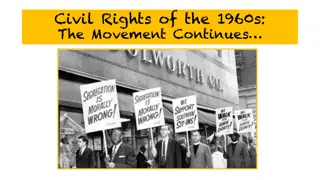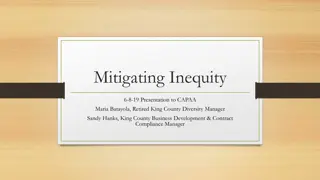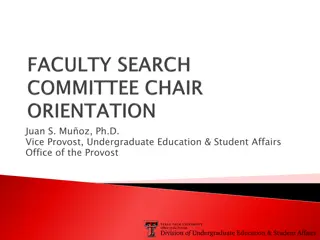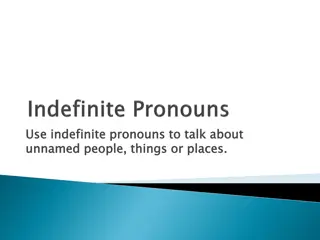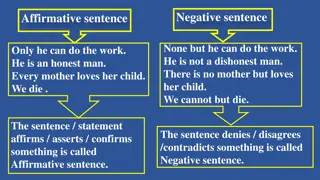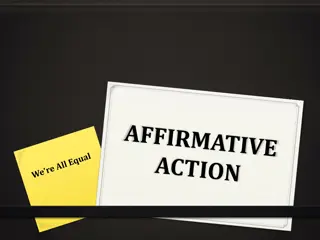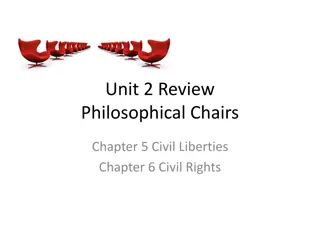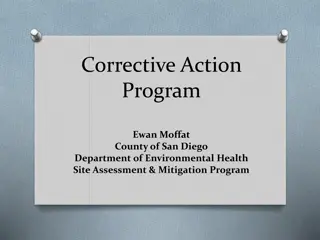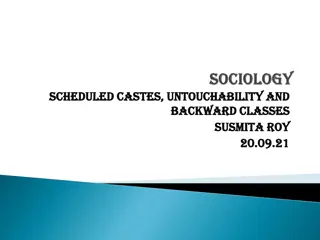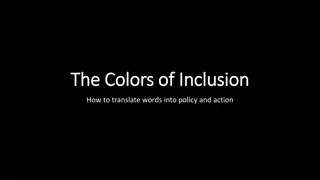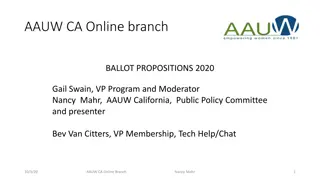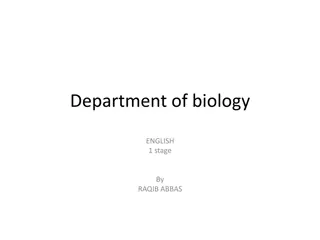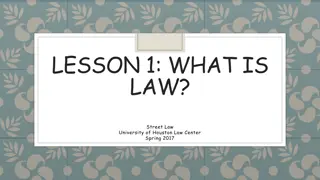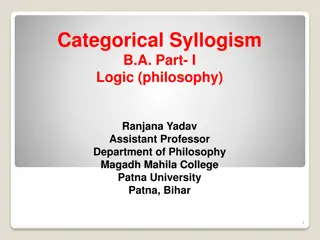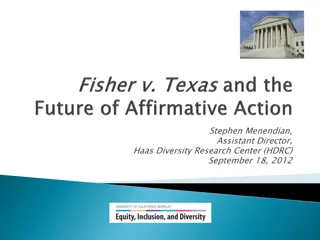Empowering Immigrant Communities: The MICA Project Overview
The Migrant & Immigrant Community Action (MICA) Project, founded in 2011, provides low-cost immigration legal services in the St. Louis and Illinois region. With a vision of creating a safe and welcoming community for immigrants, MICA offers a range of legal services including affirmative asylum, U-
0 views • 14 slides
Sentence Transformation Guidelines and Exercises for B.A. II Semester English
Understand the concept of sentence transformation to alter sentence forms without changing meanings. Learn various types of transformations like affirmative to negative, interrogative to assertive, and more. Practice exercises provided for hands-on learning.
1 views • 11 slides
Understanding Present vs. Past Tenses in English Grammar
Exploring the basics of present and past tenses in English grammar, covering affirmative, negative, and interrogative structures, as well as adverbs of frequency and quantity. Learn about describing general facts, habitual actions, and specific past events through detailed examples and visual aids.
8 views • 13 slides
English Transformation Rules: Assertive to Interrogative with Examples
Learn the rules of transforming assertive sentences into interrogative sentences in English grammar. Understand the different scenarios and examples for the transformation process. Enhance your skills in using interrogative sentences in various situations while maintaining the original meaning. Dive
1 views • 23 slides
Understanding the Importance of Immunity in Reporting Laws
Immunity in reporting laws is a critical harm reduction measure that allows sex workers, trafficking survivors, and certain crime witnesses to report incidents to police without facing arrest or charges. By providing immunity, advocates aim to mitigate the harms of anti-prostitution laws, facilitate
0 views • 6 slides
Understanding Nerves and Muscles Physiology: Lecture Insights by Dr. Amar AL-Musawi MD, PhD
Delve into the intricacies of cardiac action potential, mechanism of action potential propagation, rhythmicity in excitable tissues, and the crucial concept of refractory period. Explore how voltage-gated channels influence the duration of action potential and learn about the spontaneous generation
0 views • 12 slides
Understanding Our Constitution: Course Details and Syllabus
Enhance your understanding of the Constitution with this course led by Prof. Faizan Mustafa, President of CNU. Discover the importance of constitutional knowledge, eligibility criteria, course duration, fees, and examination details. Delve into the syllabus covering topics like citizenship, rights,
2 views • 17 slides
Pronoun Placement with Commands in English and Spanish
Understanding pronoun placement in commands is crucial in both English and Spanish. In English, pronouns are placed after the verb in both affirmative and negative commands. However, in Spanish, affirmatives attach pronouns while negatives place them in front of the verb. Examples and accent rules a
1 views • 5 slides
Pronoun Placement Rules in Spanish Sentences
Clear up confusion around the placement of reflexive, direct object, and indirect object pronouns in Spanish sentences and commands. Learn the placement rules for different types of pronouns in statements and commands, including examples for single-verb and two-verb sentences. Understand the order o
2 views • 10 slides
Understanding Counterplans in Policy Debate
Counterplans in policy debate are alternative policies presented by the negative team that compete with the affirmative plan. They must be specific, competitive, and mutually exclusive to offer net benefits over the affirmative proposal. Nontopicality and competitiveness are debated aspects, with co
0 views • 10 slides
Understanding Policy Debate Basics: Topicality, Presumption, and Case Construction
Explore the nuances of policy debate focusing on topicality, presumption, and case construction. Learn how debaters analyze the resolution, argue definitions, and use standards to ensure fairness in debates. Dive into the essential components of the First Affirmative Constructive (1AC) and how obser
0 views • 18 slides
Understanding the Importance of Staffing in Organizational Success
Staffing is a critical process in organizations that involves hiring eligible candidates for specific positions, ensuring the right people are in the right roles at the right time. It encompasses manpower planning, recruitment, selection, training, and employee welfare, ultimately contributing to ac
0 views • 20 slides
Understanding Simple Past Tense in English Grammar
Explore the usage of simple past tense through examples, irregular verbs, and regular verb forms. Learn how to form affirmative, negative, and question sentences in the past. Enhance your understanding of past actions and events with clear explanations and practice exercises.
1 views • 19 slides
Mastering Tag Questions in English Grammar
Learn how to effectively construct and use tag questions in English grammar through four basic rules: ensuring same tense, using negative tags for affirmative sentences and vice versa, always including a pronoun, and using contracted forms of helping verbs in negative tags. Examples provided for bet
0 views • 25 slides
Civil Rights Movement of the 1960s: A Historic Journey
The Civil Rights Movement of the 1960s was a pivotal time in American history marked by significant events such as the Freedom Riders, University of Mississippi integration, Birmingham Campaign, March on Washington, Freedom Summer, Civil Rights Act of 1964, Selma to Montgomery March, and the emergen
0 views • 12 slides
Addressing Inequity Through Legislation and Action
Explore the historical pursuit of equity in the United States, from constitutional provisions to civil rights legislation. Delve into the impact of equity laws, employment tools, and affirmative action on mitigating inequity, with a focus on promoting non-discrimination and fostering diversity and i
0 views • 13 slides
University Faculty Search and Affirmative Action Overview
This content discusses the paramount characteristics for conducting faculty searches, including consistency, transparency, and equity. It emphasizes the importance of diversity and underrepresented minorities in the recruitment process, as mandated by Affirmative Action policies. Failure to meet Aff
0 views • 16 slides
Understanding Indefinite Pronouns in English
In English grammar, indefinite pronouns are used to refer to unnamed people, things, or places. They can be affirmative, negative, or used in questions. Examples like "some," "any," and their variations are common in everyday conversations. Learn how to use them correctly to convey the intended mean
0 views • 8 slides
Understanding the Usage of "Some" and "Any" in English Grammar
Learn the differences between using "some" and "any" in English sentences through examples and exercises. Discover when to utilize "some" for affirmative sentences and "any" for questions and negative sentences. Practice with provided exercises to enhance your grammar skills.
0 views • 7 slides
Simple Present Tense: Usage, Formation, and Spelling Rules
Explore the Simple Present Tense through daily routines, affirmative statements, formation rules for different pronouns, spelling guidelines for adding final -s, and forming interrogative sentences. Understand how to express habits, truths, and routines in English using clear examples and explanatio
0 views • 12 slides
Understanding Affirmative and Negative Sentences Structures
Exploring the structure of affirmative and negative sentences through various examples involving the use of words like "only," "none but," and "nothing but." Learn how these constructions highlight affirmations or denials in English grammar.
0 views • 5 slides
Understanding Affirmative Action: Origins and Criticisms
Affirmative Action was first proposed in the US by President John F. Kennedy in 1961 to combat discrimination. It aimed to prevent discrimination based on race, color, religion, sex, and national origin. This policy evolved into two forms: Strong Affirmative Action, which involves preferential treat
0 views • 39 slides
Understanding English Tenses: Simple Present and Sentence Structure
Explore the Simple Present tense in English, learn how to form affirmative, negative, and question sentences, understand signal words, and discover the usage of long forms and contracted forms. Enhance your knowledge of using affirmatives, pronouns, modals, and sentence structures in English. Improv
0 views • 8 slides
Understanding the Present Perfect Simple Tense
Learn about the usage of the Present Perfect Simple tense, including affirmative, negative, and question forms, time expressions, and practice exercises to enhance your understanding of this important aspect of English grammar.
0 views • 7 slides
Exploring Key Constitutional Debates: Civil Liberties, Civil Rights, and More
Explore vital topics such as the 1st Amendment, search and seizure laws, due process, gender equality, reproductive rights, affirmative action, and beyond. Engage in debates surrounding these critical issues and delve into landmark legal cases that have shaped American society.
0 views • 9 slides
Evolution of Affirmative Action Policies in College Admission in China
The historical development of affirmative action policies in college admissions in China is traced from the Republic Era to contemporary times. The policies have evolved from preferential treatment based on certain backgrounds to programs benefiting ethnic minorities and residents in underdeveloped
0 views • 20 slides
English Lesson on Transformation of Sentences: From Affirmative to Negative
This English lesson conducted by Md. Jamal Hossain covers the transformation of sentences from affirmative to negative for Class Nine students. The lesson focuses on key learning outcomes such as changing sentences, speaking, reading, and writing. Examples and exercises are provided to help students
0 views • 9 slides
Understanding Membrane Potential and Action Potentials in Excitable Cells
Membrane potential, resting potential, and action potentials play crucial roles in the functioning of excitable cells like neurons, muscle cells, and endocrine cells. Voltage-gated channels, depolarization, and repolarization are key processes involved in generating and propagating action potentials
0 views • 26 slides
San Diego Environmental Health Corrective Action Programs Overview
In the County of San Diego, the Department of Environmental Health oversees Corrective Action programs for permitted facilities. This includes the Corrective Action Designation, SAM Programs, exclusions from Corrective Action, and sources of Corrective Action cases. The program covers releases from
0 views • 12 slides
Understanding Scheduled Castes, Untouchability, and Backward Classes in India
The Scheduled Castes (SCs) and Scheduled Tribes (STs) in India are officially recognized groups, representing about 16.6% and 8.6% of the population respectively. They were historically known as Depressed Classes and have been given reservation status for political representation. The government has
0 views • 20 slides
An Overview of Debate: Propositions, Teams, and Formats
Debate is a regulated discussion between two matched sides discussing a proposition, with the affirmative arguing for change and the negative defending the status quo. The standard debate format involves constructive arguments followed by rebuttals from both sides. The roles in a debate include the
0 views • 47 slides
Key Aspects of American History: JFK & LBJ Domestic Policies
Explore the major goals and initiatives of the civil rights movement in the 1960s, highlighting key legislative achievements like the Civil Rights Act of 1964. Delve into the impact of leaders such as JFK and LBJ on domestic policies, addressing issues of equality, affirmative action, and social jus
0 views • 24 slides
Learn the Present Simple Tense: Affirmative, Negative, and Question Forms
Explore the Present Simple Tense with examples of affirmative, negative, and question forms in English. Master usage through practical sentences and improve your language skills effectively.
0 views • 9 slides
Understanding Diversity and Inclusion in Policy and Action
Exploring the evolution of equal employment opportunity laws, this content delves into the definitions of races, physical characteristics, and the implications of discrimination based on these factors. It also discusses Affirmative Action, diversity, inclusion, and allyship in the context of promoti
0 views • 7 slides
2020 AAUW CA Online Branch Ballot Propositions Overview
The 2020 AAUW CA Online Branch provides information on the ballot propositions for the upcoming election, including details on civil and voting rights, property taxation, criminal justice regulation, and more. Propositions such as Prop 14 focus on stem cell research funding, while Prop 15 addresses
0 views • 17 slides
Understanding Past Perfect Tense in English Grammar
Past Perfect Tense is used to denote actions that were completed before another action occurred in the past. It is formed using the auxiliary verb "had" followed by a past participle. Examples of affirmative, negative, and question forms are provided to illustrate usage. The tense helps in sequencin
0 views • 4 slides
Exploring the Significance of Law: Lessons on Equality and Justice
Delve into the essence of law through the poignant story of Loving v. Virginia, examining how laws shape society and influence individual freedoms. Reflect on the impact of legal systems, affirmative action, moral values, and societal goals. Engage in discussions about laws, rules, and regulations a
0 views • 7 slides
Climate Action Project - Inspiring Change in Schools
Urgent climate change issues were explored this week, emphasizing the importance of everyone's involvement. The impact of climate change on Earth and the significance of climate justice were highlighted. Climate anxiety and global solutions were discussed, emphasizing that personal actions can lead
0 views • 8 slides
Understanding Categorical Syllogism in Logic: A Comprehensive Overview
Categorical syllogism, a form of inference with two premises and a conclusion, is a fundamental concept in logic. This type of deductive argument consists of three categorical propositions - universal affirmative, universal negative, particular affirmative, and particular negative. Terms such as maj
0 views • 16 slides
Affirmative Action and Race-Conscious Admissions: The Fisher v. Texas Case
The content discusses the Fisher v. Texas case, where Abigail Fisher, a white female, was denied admission to the University of Texas and challenged the use of race in admissions. It explores the 10% law, holistic admissions, and the debate surrounding affirmative action policies. The demographic br
0 views • 44 slides
